八年级英语下册知识点归纳(牛津英语)
- 格式:doc
- 大小:549.50 KB
- 文档页数:36
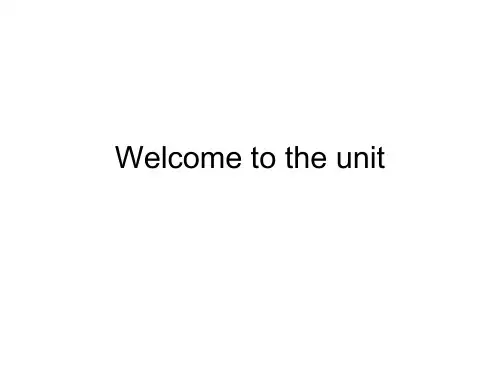
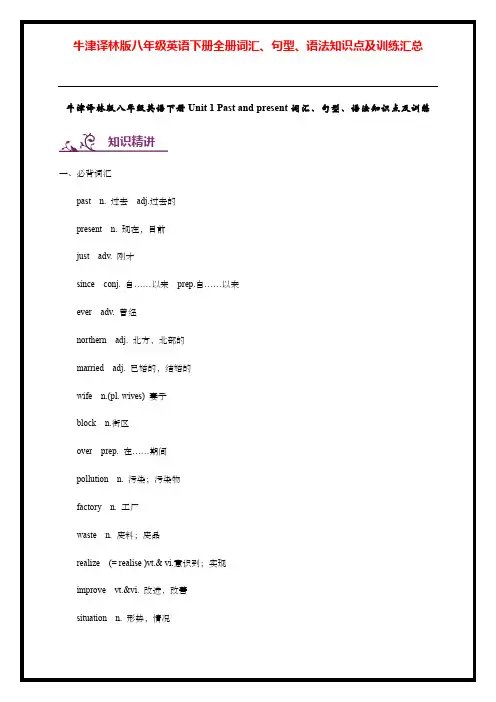
牛津译林版八年级英语下册Unit 1 Past and present词汇、句型、语法知识点及训练知识精讲一、必背词汇past n. 过去adj.过去的present n. 现在,目前just adv. 刚才since conj. 自……以来prep.自……以来ever adv. 曾经northern adj. 北方,北部的married adj. 已婚的,结婚的wife n.(pl. wives) 妻子block n.街区over prep. 在……期间pollution n. 污染;污染物factory n. 工厂waste n. 废料;废品realize (= realise )vt.& vi.意识到;实现improve vt.&vi. 改进,改善situation n. 形势,情况impossible adj. 不可能的before adv.以前,过去lonely adj. 孤独的,寂寞的anyway adv. 尽管,即使这样husband n. 丈夫interview n. 采访;会见yet adv. 还,仍recently adv.近来,最近environment n. 环境transport n.交通车辆,运输工具condition n. 环境,条件,状况return vi. 返回last adv.最近,上一次;最后abroad adv. 到(在)国外primary adj. 小学教育的;初级的communicate vt. &vi. 交流,交际exactly adv.(答语)正是,没错narrow adj. 狭窄的二、重点词汇1. present noun /ˈprez.ənt/1). something that you are given, without asking for it, on a special occasion, especially to showfriendship, or to say thank you(尤指表示友谊或致谢的)礼物,赠品例句:They gave me theatre tickets as a present.他们送给我戏票作为礼物。
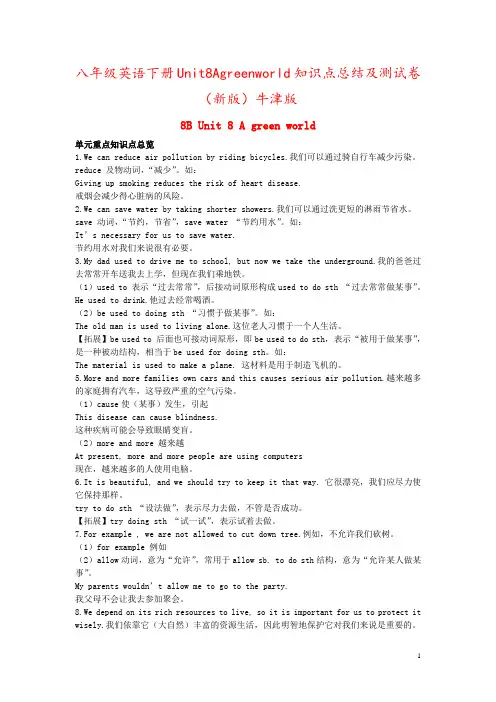
八年级英语下册Unit8Agreenworld知识点总结及测试卷(新版)牛津版8B Unit 8 A green world单元重点知识点总览1.We can reduce air pollution by riding bicycles.我们可以通过骑自行车减少污染。
reduce 及物动词,“减少”。
如:Giving up smoking reduces the risk of heart disease.戒烟会减少得心脏病的风险。
2.We can save water by taking shorter showers.我们可以通过洗更短的淋雨节省水。
save 动词,“节约,节省”,save water “节约用水”。
如:It’s necessary for us to save water.节约用水对我们来说很有必要。
3.My dad used to drive me to school, but now we take the underground.我的爸爸过去常常开车送我去上学,但现在我们乘地铁。
(1)used to 表示“过去常常”,后接动词原形构成used to do sth “过去常常做某事”。
He used to drink.他过去经常喝酒。
(2)be used to doing sth “习惯于做某事”。
如:The old man is used to living alone.这位老人习惯于一个人生活。
【拓展】be used to 后面也可接动词原形,即be used to do sth,表示“被用于做某事”,是一种被动结构,相当于be used for doing sth。
如:The material is used to make a plane. 这材料是用于制造飞机的。
5.More and more families own cars and this causes serious air pollution.越来越多的家庭拥有汽车,这导致严重的空气污染。
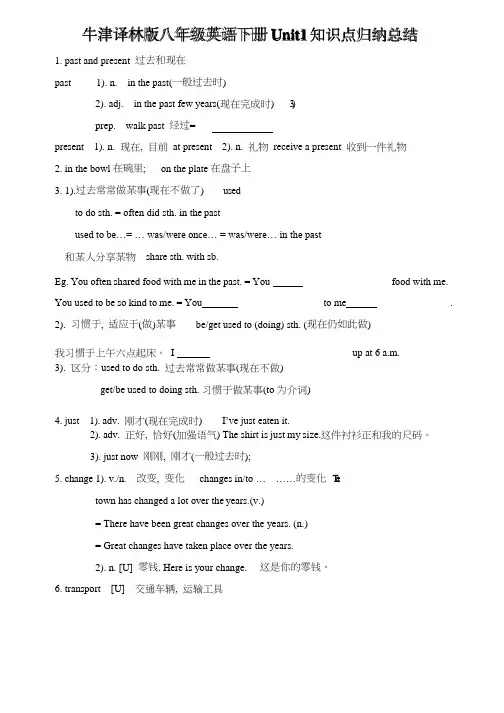
1. past and present 过去和现在past 1). n. in the past(一般过去时)2). adj. in the past few years(现在完成时) 3). prep. walk past 经过=present 1). n. 现在, 目前 at present 2). n. 礼物 receive a present 收到一件礼物 2. in the bowl 在碗里; on the plate 在盘子上 3. 1).过去常常做某事(现在不做了) usedto do sth. = often did sth. in the pastused to be…= … was/were once… = was/were… in the past 和某人分享某物 share sth. with sb.Eg. You often shared food with me in the past. = Youfood with me.You used to be so kind to me. = Youto me.2). 习惯于, 适应于(做)某事 be/get used to (doing) sth. (现在仍如此做)我习惯于上午六点起床。
Iup at 6 a.m.3). 区分:used to do sth. 过去常常做某事(现在不做)get/be used to doing sth. 习惯于做某事(to 为介词)4. just 1). adv. 刚才(现在完成时) I’v e just eaten it.2). adv. 正好, 恰好(加强语气) The shirt is just my size.这件衬衫正和我的尺码。
3). just now 刚刚, 刚才(一般过去时);5. change 1). v./n. 改变, 变化 changes in/to … ……的变化 T h etown has changed a lot over the years.(v.)= There have been great changes over the years. (n.)= Great changes have taken place over the years.2). n. [U] 零钱. Here is your change. 这是你的零钱。
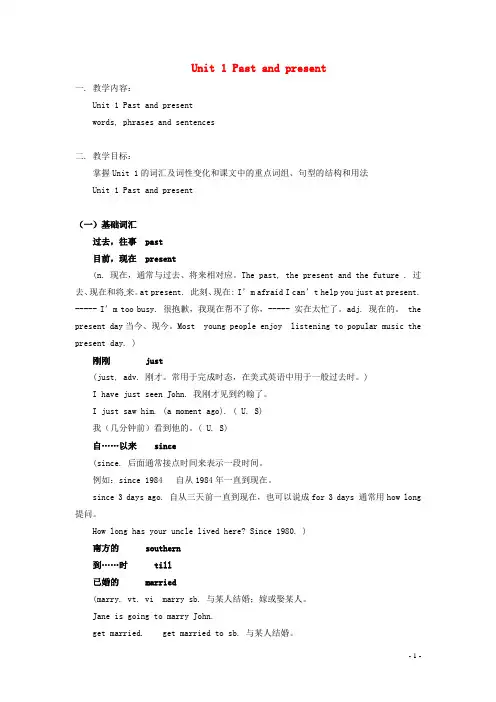
Unit 1 Past and present一. 教学内容:Unit 1 Past and presentwords, phrases and sentences二. 教学目标:掌握Unit 1的词汇及词性变化和课文中的重点词组、句型的结构和用法Unit 1 Past and present(一)基础词汇过去,往事 past目前,现在 present(n. 现在,通常与过去、将来相对应。
The past, the present and the future . 过去、现在和将来。
at present. 此刻、现在: I’m afraid I can’t help you just at present. ----- I’m too busy. 很抱歉,我现在帮不了你,----- 实在太忙了。
adj. 现在的。
the present day当今、现今。
Most young people enjoy listening to popular music the present day. )刚刚 just(just, adv. 刚才。
常用于完成时态,在美式英语中用于一般过去时。
)I have just seen John. 我刚才见到约翰了。
I just saw him. (a moment ago). ( U. S)我(几分钟前)看到他的。
( U. S)自……以来 since(since. 后面通常接点时间来表示一段时间。
例如:since 1984 自从1984年一直到现在。
since 3 days ago. 自从三天前一直到现在,也可以说成for 3 days 通常用how long 提问。
How long has your uncle lived here? Since 1980. )南方的 southern到……时 till已婚的 married(marry. vt. vi marry sb. 与某人结婚;嫁或娶某人。
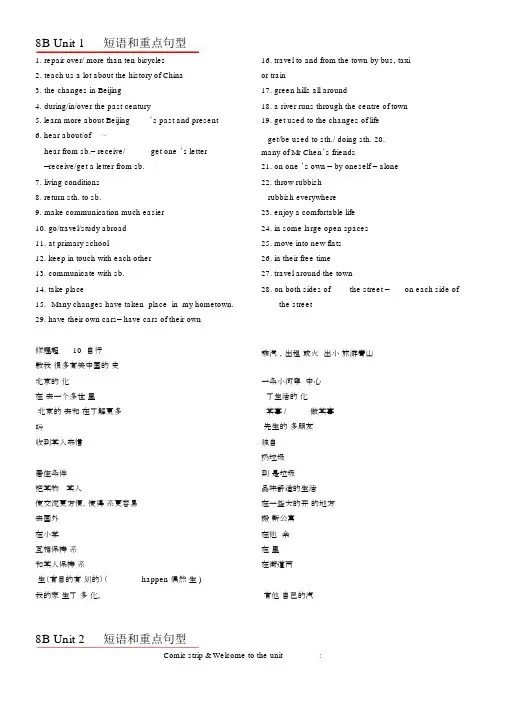
8B Unit 1短语和重点句型1.repair over/ more than ten bicycles2.teach us a lot about the history of China3.the changes in Beijing4.during/in/over the past century5. learn more about Beijing’s past and present6. hear about/of⋯hear from sb.= receive/get one ’s letter=receive/get a letter from sb.7.living conditions8.return sth. to sb.9.make communication much easier10.go/travel/study abroad11.at primary school12.keep in touch with each othermunicate with sb.14.take place15.Many changes have taken place in my hometown.29.have their own cars= have cars of their own修理超10 自行教我很多有关中国的史北京的化在去一个多世里北京的去和在了解更多听收到某人来信居住条件把某物某人使交流更方便,使得系更容易去国外在小学互相保持系和某人保持系生(有目的有划的)(happen 偶然生 )我的家生了多化。
8B Unit 2短语和重点句型16.travel to and from the town by bus, taxior train17.green hills all around18.a river runs through the centre of town19.get used to the changes of lifeget/be used to sth./ doing sth. 20.many of Mr Chen’s friends21.on one ’s own = by oneself = alone22.throw rubbishrubbish everywhere23.enjoy a comfortable life24.in some large open spaces25.move into new flats26.in their free time27.travel around the town28. on both sides of the street =on each side ofthe street乘汽,出租或火出小旅游青山一条小河穿中心了生活的化某事 /做某事先生的多朋友独自扔垃圾到是垃圾品味舒适的生活在一些大的开的地方搬新公寓在他余在里在街道两有他自己的汽Comic strip & Welcome to the unit:1.去某地度假go to sp for a holiday在度假be on holiday2.我以前去那。
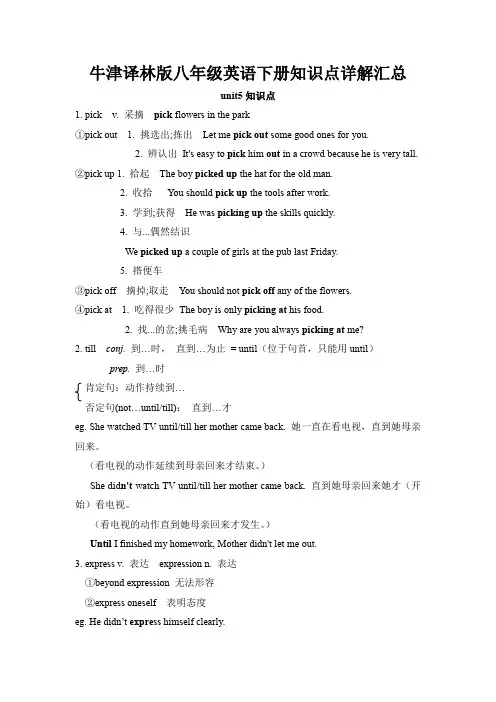
牛津译林版八年级英语下册知识点详解汇总unit5知识点1. pick v. 采摘pick flowers in the parkeg. She watched TV until/till her mother came back. 她一直在看电视,直到她母亲回来。
(看电视的动作延续到母亲回来才结束。
)She did n't watch TV until/till her mother came back. 直到她母亲回来她才(开始)看电视。
(看电视的动作直到她母亲回来才发生。
)Until I finished my homework, Mother didn't let me out.3. express v. 表达expression n. 表达①beyond expression 无法形容②express oneself 表明态度eg. He didn’t express himself clearly.例题:( )1. Millie was just going to tell the truth when Tom _______ her.A cut B.cut in C. cut in on D. cut into( )2. Why do you keep the door_______ ?A closeB closedC closing D. closes( )3. Can I go along with you? I won't get_______.A.by the way B on the way C.in the way D to the way( )4.The summer holidays are coming, so the twins as well as Jack_______ to Hong Kong for vacation.A.is going B are going C.goes D. go二、unit61. train意为“培训,接受训练”。
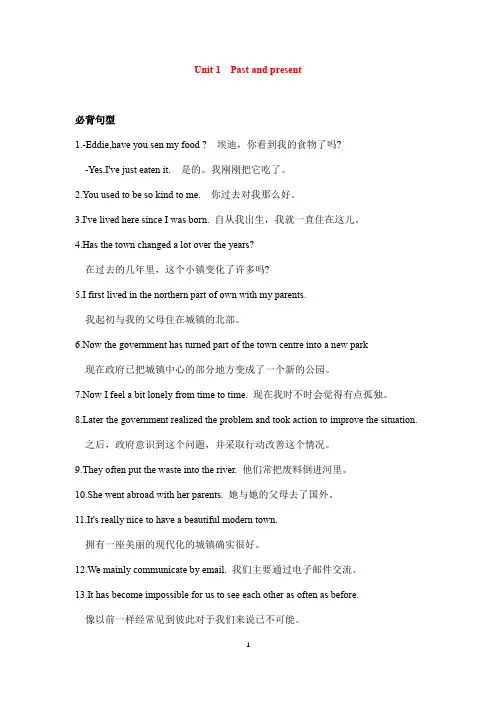
Unit 1 Past and present必背句型1.-Eddie,have you sen my food ? 埃迪,你看到我的食物了吗?-Yes.I've just eaten it. 是的。
我刚刚把它吃了。
2.You used to be so kind to me. 你过去对我那么好。
3.I've lived here since I was born. 自从我出生,我就一直住在这儿。
4.Has the town changed a lot over the years?在过去的几年里,这个小镇变化了许多吗?5.I first lived in the northern part of own with my parents.我起初与我的父母住在城镇的北部。
6.Now the government has turned part of the town centre into a new park现在政府已把城镇中心的部分地方变成了一个新的公园。
7.Now I feel a bit lonely from time to time. 现在我时不时会觉得有点孤独。
ter the government realized the problem and took action to improve the situation.之后,政府意识到这个问题,并采取行动改善这个情况。
9.They often put the waste into the river. 他们常把废料倒进河里。
10.She went abroad with her parents. 她与她的父母去了国外。
11.It's really nice to have a beautiful modern town.拥有一座美丽的现代化的城镇确实很好。
12.We mainly communicate by email. 我们主要通过电子邮件交流。
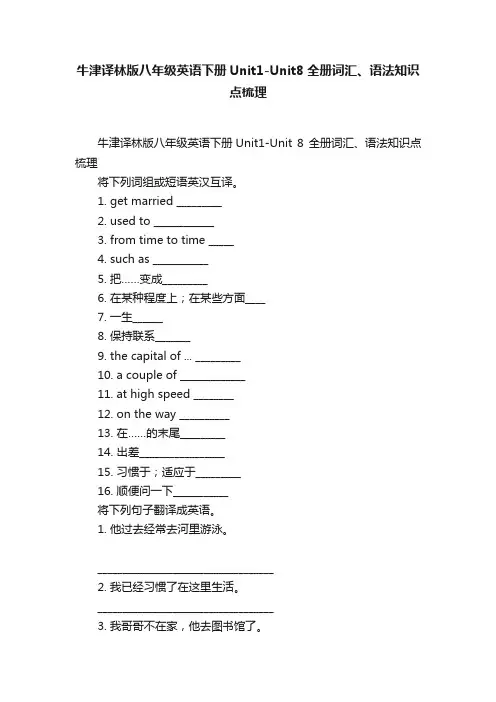
牛津译林版八年级英语下册Unit1-Unit8全册词汇、语法知识点梳理牛津译林版八年级英语下册Unit1-Unit 8 全册词汇、语法知识点梳理将下列词组或短语英汉互译。
1. get married _________2. used to ____________3. from time to time _____4. such as ___________5. 把……变成_________6. 在某种程度上;在某些方面____7. 一生______8. 保持联系_______9. the capital of ... _________10. a couple of _____________11. at high speed ________12. on the way __________13. 在……的末尾_________14. 出差_________________15. 习惯于;适应于_________16. 顺便问一下___________将下列句子翻译成英语。
1. 他过去经常去河里游泳。
___________________________________2. 我已经习惯了在这里生活。
___________________________________3. 我哥哥不在家,他去图书馆了。
___________________________________4. 他们离开上海一年了。
___________________________________5. 我保证你会喜欢我的礼物的。
___________________________________考点一:现在完成时的基本用法现在完成时表示从过去持续到现在的动作或状态,或已完成但对现在有一定影响的动作。
它的结构是“主语+have / has+ 动词过去分词+其他”。
常和already、ever、just、never、recently、yet 等副词以及since 和for 引导的时间状语连用。
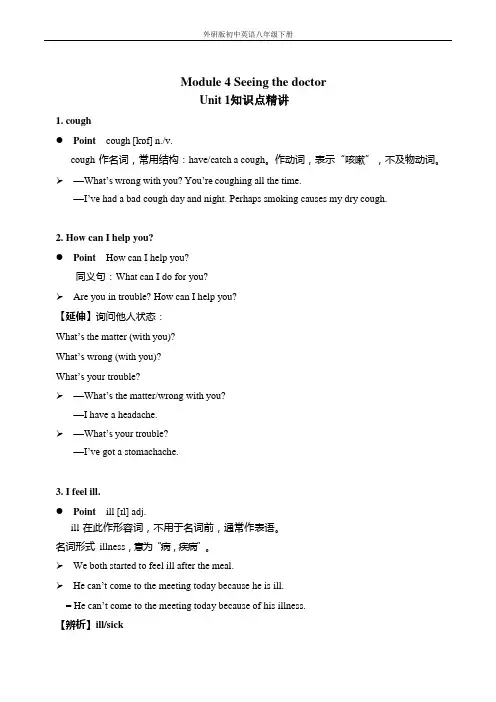
Module 4 Seeing the doctorUnit 1知识点精讲1.cough●Point cough [kɒf] n./v.cough 作名词,常用结构:have/catch a cough。
作动词,表示“咳嗽”,不及物动词。
➢—What’s wrong with you? You’re coughing all the time.—I’ve had a bad cough day and night. Perhaps smoking causes my dry cough.2.How can I help you?●Point How can I help you?同义句:What can I do for you?➢Are you in trouble? How can I help you?【延伸】询问他人状态:What’s the matter (with you)?What’s wrong (with you)?What’s your trouble?➢—What’s the matter/wrong with you?—I have a headache.➢—What’s your trouble?—I’ve got a stomachache.3.I feel ill.●Point ill [ɪl] adj.ill 在此作形容词,不用于名词前,通常作表语。
名词形式illness,意为“病,疾病”。
➢We both started to feel ill after the meal.➢He can’t come to the meeting today because he is ill.= He can’t come to the meeting today because of his illness.【辨析】ill/sickill 表示“有病的”,通常用作表语。
Her mother is ill in hospital.sick 表示“生病的”,可用作表语或定语。
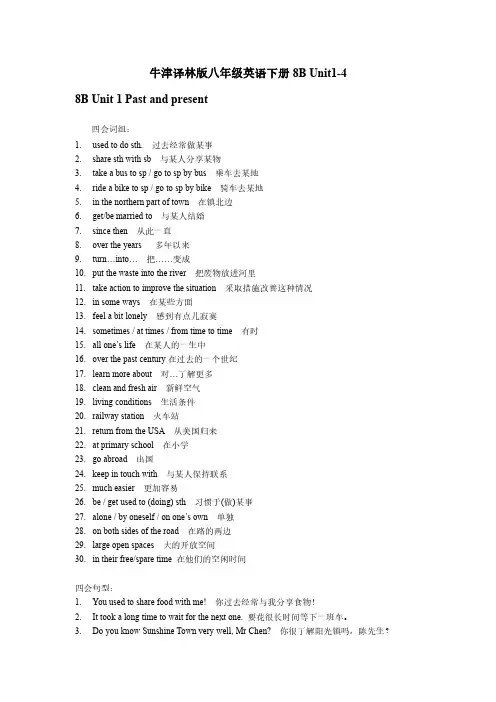
牛津译林版八年级英语下册8B Unit1-48B Unit1Past and present四会词组:ed to do sth.过去经常做某事2.share sth with sb与某人分享某物3.take a bus to sp/go to sp by bus乘车去某地4.ride a bike to sp/go to sp by bike骑车去某地5.in the northern part of town在镇北边6.get/be married to与某人结婚7.since then从此一直8.over the years多年以来9.turn…into…把……变成10.put the waste into the river把废物放进河里11.take action to improve the situation采取措施改善这种情况12.in some ways在某些方面13.feel a bit lonely感到有点儿寂寞14.sometimes/at times/from time to time有时15.all one’s life在某人的一生中16.over the past century在过去的一个世纪17.learn more about对…了解更多18.clean and fresh air新鲜空气19.living conditions生活条件20.railway station火车站21.return from the USA从美国归来22.at primary school在小学23.go abroad出国24.keep in touch with与某人保持联系25.much easier更加容易26.be/get used to(doing)sth习惯于(做)某事27.alone/by oneself/on one’s own单独28.on both sides of the road在路的两边rge open spaces大的开放空间30.in their free/spare time在他们的空闲时间四会句型:1.You used to share food with me!你过去经常与我分享食物!2.It took a long time to wait for the next one.要花很长时间等下一班车。
八年级牛津下册英语知识点英语作为一门国际通用语言,在现代社会扮演着重要的角色。
学好英语,对我们的学业、职业、进一步的发展、交流等方面都有很大的益处。
而在英语学习的道路上,知识点的积累是很重要的一项任务。
下面就让我们来了解一下八年级牛津下册英语知识点。
一、动词时态在英语的学习过程中,动词时态是我们需要掌握的一个基本概念。
八年级牛津下册英语涉及到了多种动词时态,包括简单现在时、一般过去时、现在进行时、过去进行时、一般将来时、过去将来时等。
在学习时,我们需要通过不断的练习和记忆,以便更好地理解和运用动词时态。
二、名词名词是英语词汇中的基本单位,包括人名、地名、物品、动物等各种实体。
八年级牛津下册英语中有很多名词需要掌握,包括可数名词、不可数名词、单数名词、复数名词等。
在学习时,我们需要理解名词在句子中起到的作用,并通过练习记忆名词的各种形式和用法,以便更好地应用到实际交流中。
三、形容词与副词形容词和副词是描述词和动词性词语的重要类别。
在八年级牛津下册英语中,我们需要掌握形容词和副词的用法、形态和比较级等相关知识。
同时,还需要理解形容词和副词在句子中的位置以及它们的作用,以便更好地表达自己的意思和理解他人的语言。
四、介词介词是连接名词、代词、动词等成语的重要语法概念。
在八年级牛津下册英语中,介词也是一个需要掌握的重要知识点。
我们需要理解介词在句子中的位置和作用,并学习介词的常见用法和相关语法规则,以便更好地使用它们在实际交流中。
五、连词连词是连接词组或句子的语法元素,是英语交流中不可或缺的部分。
八年级牛津下册英语中也涉及到了多种连词,包括并列连词、从属连词、并列副词和连接副词等。
我们需要通过学习和实际交流中的体会,更好地理解连词的作用和用法,以便更好地应用到实际生活中。
总结以上就是八年级牛津下册英语知识点的相关介绍。
在学习英语的过程中,我们需要不断积累和巩固这些知识点,以便更好地理解和使用英语。
同时,我们也需要不断地与他人交流,不断提升自己的英语水平,以便更好地应对各种实际情况和场景。
牛津译林版八年级英语下册8B Unit 1知识点归纳一.(1)易错单词及重点单词.passed\ past; present\ parent; wife\ wives; realize; reduce; alone\ along; century;developed\ developing\ development; feel\ fall(2)复数:life—lives; wife—wives; knife—knives; loaf—loaves; leaf—leaves; shelf—shelves;wolf—wolves; thief—thieves(3)过去式, 过去分词:throw—threw—thrown; sew—sewed—sewn; blow—blew—blown; fall—fell-fallen;fell—felt—felt;二.重要单词用法.1.past: 1) n. in the past过去时; 2) adj. in the past few years现在完成时;3) prep. half past one4) adv. walk past sp.--- He was the first to pass the finishing line.He passed the finishing line.He was first past the finishing line.2.present: (n) the past, the present(现在)and the futureat present= right now= at the momentpresent= gift礼物present: (v) --- presentation (n) the presentation of cup and medalspresent sb with sth.--- sb be presented with sth.3.since: (prep) :自---以来; 既然:since 1984 ; since 3 years agosince+过去的时间\过去的状语从句\ 一段时间+ago--- How long has your uncle lived here? --- Since 1980.\two years ago.(conj)--- He has lived here since he was born.Since(既然)everyone is here , let’s begin the meeti ng.4.south (n)--- southern (adj) north--- northerneast—eastern west--- westernsouth\ north\ east\ west of--- The zoo is (to the ) north of the station.in the south of--- : Guangzhou is in the south of China.to the south of--- : Wuxi is(to the) south of Taizhou.on the south of--- : Jiangsu is on the south of Shandong.5.till\ until: (prep) until midnight; at midnight--- The restaurant is open until midnight.(conj) She waited until her mother came back.Don’t get off the bus until it stops.till\ until (时间);up to (数字):直到---not--- until---: 直到---才--- (主将从现)6.marry (v)--- married (adj) --- marriage: (n)marry sb; get married (to---); marry A to B; be married (to---) celebrate their fifteen years of marriage--- They have been married for ten years.They got married two years ago.When did he get married?--------------- marry her?----------------get married to her?7.wife--- wives (复数)More than one wife is----: 不只一个妻子---(谓语动词用单数)8.turn (v)--- turning (n)拐角处take turns to do sth.; It’s one’s turn to do sth.turn to page 5 ; turn red\ greenturn right at the first crossing= take the first turning on the righte:\z\ ( v). --- use:\s\ (n.) --- useful\ useless: \s\ (adj)be in use= be in service ---- The railway station has been in service since 2002. use---to do-- --- We use wood to make paper.sth. be used to do --- Wood is used to make paper.use--- for doing --- We use wood for making paper.sth. be used for doing --- Wood is used for making paper.be\get used to doing: 习惯于做---used to do sth: 过去常常做某事--- My grandpa used to read newspapers after supper,but now he is used to going walking.10.waste: (n) a waste of time(浪费时间);talk to him is a waste of timedump its waste into the river11.pollute: (v)--- pollution: (n)---polluted:( adj)pollute the river; polluted water; water\ air\ noise\light pollutiontake action to reduce the pollution12.open: (v)--- open: (adj) have\has been openclose: (v)--- closed: (adj) have\has been closedopen\ close the door; keep the door open\ closed--- The factory opened five years ago.--- The factory has been open for five years.13. (1) a little a little\ a bit\ a little bit hungry{a bit }+原级\比较级----------------------------easiera little bit(2) a bit of +不可数名词= a little---: a little\ a bit of water(3) not --- a bit= not at all: 一点儿也不(4)not--- a little= very: 非常14.lonely: (adj) 作表语\定语alone: (adv) 作表语\状语alone= on one’s own= by oneselffeel lonely; a lonely house; be alone; live alone--- He lives alone in a lonely house, but he doesn’t feel lonely.15.interview sb= have an interview with sb.16.luck: (n)--- lucky: (adj) --- luckily: (adv)---luckier—luckiest ---more luckily\ the most luckily good luck\ bad luck; wish you good luck; good luck to sb with sth.--- Luckily, he was not badly hurt.17.from time to time= at times= sometimes: 有时候at all times= all the time: 总是,一直18.用于现在完成时的词:ever\ never\ just\ before\ already\ yet\ since\ recently\over (in) the past(last) few years19.(1)develop (v): 培养develop the habit of doing---;develop the plants that can grow on Mars(2)developed (adj):发达的---- America is a developed country;less developed:欠发达的(3)developing (adj)发展中的---- China is a developing country(4)development (n) --- with the development of ---20.lend--- lent--- lentlend sb sth= lend sth to sb.borrow sth from sb--- You can borrow any book from the library, but you can’t lend it to others.21.relax: (v)--- relaxed : (adj)relaxing: 令人放松的--- The relaxing music makes me relaxed. 22.feel: (v)--- feeling: (n)feel—felt—felt; fall—fell—fallenhave the same feeling; create a feeling of harmonyfeel relaxed; hurt one’s feelings23. advantage – disadvantage (可数)the advantages of doing sth.24. recent adj.(指时间) in the recent photo(近照)recently adv.25. realize:(v)实现\意识到---realistic:(adj)现实的realize the importance of doing sth.realize one’s mistakeseg: I realized my dream.= My dream has been realized.=My dream has come true.26. with the development of science and technology:随着科学技术的发展27. Fathe r’s Day父亲节; Parent s’ meeting家长会:28. in:表示在内部;on:表示接壤;to:表示不包含不接壤29. What problems do they have to solve (solve)?---------------------------------- solving (solve)---?复习Page 8-11 , Page 21-22三.重点短语及句型.下象棋: play Chinese chess 在不同时代: at different times空地: open space 结婚:get married在某些方面:in some ways 在小学:be in primary school下棋: play chess 在---的南部:in the southern part of--- 变化很大:change a lot 时常,偶尔:from time to time单独:be alone=all by oneself 带来很多好处:bring many advantages 投入使用:be in service\use 过着现代化的生活:live a modern life 有同感:have the same feeling 引起许多问题:cause many problems 采取措施减少污染: take action to reduce the pollution变成一个新名胜:become a new interesting place将这个地方变成公园:turn the place into a park出国深造:go abroad for further study\education.四.词汇短语.1.marry: (vt\vi) marry sb; get married (to sb---);be married (to sb--); marry A to B ----He and she have got married.Jane’s going to marry John.He is married to a famous writer.2.turn: turn--- (from A ) into B--- Water turns into ice when it freezes.Now the school has turned into\become a supermarket.3.miss : (1) The post office is 100 metres along this road, you can’t miss it.(2)miss a meeting\ a class\ the train\ the chance+to do sth.错过做---的机会(3)miss sb. miss sb very muchmiss doing sth= fail to do sth. 错过做---4.please : (v) pleased:(adj)指人pleasant: (adj)指物pleasure: (n)be pleased to do;be{pleased\satisfied\ happy}with :对---满意sth please sb: 某物使人高兴---The news pleased us.\ made us pleased.---1) Thank you for your help. ---It’s a\my pleasure不用谢---2) Can you help me? ---With pleasure.很乐意---3) What pleasant weather it is!---4) (It is +adj+to do sth.)It’s pleasant to do sth.= It’s a pleasure to do sth.5.pollute (v) –-- We must stop the{river from being polluted.pollution to live a happy life.(表目的)pollution (n)--- air\ noise\ water pollution6.lonely\ alonea lonely village---He is alone, but he never feels lonely.Her mother doesn’t allow her to go out alone.7.although: (conj)--- Although he said they were married, I’m sure they aren’t.(注:although 不能与but连用,但可以与yet连用)--- Although he was only ten, (yet) he knew a lot.8.change :1)(n) a physical change:物理变化; a chemical change:化学变化2)(v) Our city has changed a lot.9.surprised: (adj) --- We’re all surprised to hear the news.surprising: (adj) --- a surprising result--- He was surprised at the surprising news.surprise: (v) . --- What he said surprised me.= made me surprised.surprise: (n) --- in surprise; in fear; in dangerto one’s surprise\ fear\ joy\ happiness\ sadness10.feeling: (n) a feeling of hunger\ joy\ danger---have no feeling of othersfeelings:(复数) hurt one’s feelings.11.cause: 1)vt. (cause sb to do sth. 使某人做---)--- The cold weather caused the plants to die.She’s always causing trouble\make trouble for people.My car has caused me a lot of trouble.2)n.原因the cause of stress(原因)= the reason for sth(理由).;五.句型:1. not---any more--- I don’t want to play with y ou any more.--- People often ask me to spell my name and now I don’t want to spell my name any more2.I have known it since I was very young.I have heard of Liu Huan since I was very young.3.It +be+adj +(for sb) to do sth.--- It has become very difficult to see my old friends.--- It’s nice to have open space and pretty gardens.--- It’s good to drink a cup of water after you get up in the morning.4 .I’m happy that my mother has free time in the morning now.I’m happy that you have c ome.5.It used to be the home of many wild animals.He used to be a history teacher.He used to live in the country(农村).There used to be a park near our school.六.写作.以The changes to my hometown为题写一篇短文.提示:1.对家乡的过去作简单2.谈谈家乡现在的变化3.畅想家乡的未来8B Unit2一.单词.symbol fantastic include:(v) including:(prep) speed excitement harm experience meaningful abroad endless二.短语.1.bring---with---: (反)take--- with---; carry --- with--2.go hiking; go jogging:慢跑(jog—jogged—jogged—jogging)3.see the beautiful view4.at the entrance to sp.5.at high speed:高速; at low speed:低速; at top speed:疾速;at full speed:全速at the speed of---:以---速度:6.through the whole ride7.such as8.in all总共9.scream with excitement10.all year round11.a meaningful experience12.travel abroad13.be excited about---14.have a bird’s-eye view of:鸟瞰15.cultural centre:文化中心三.句型.1. go on a trip to sp. go on holiday go to Japan for a holiday2. It must be fun.3. Can I join you?4. can’t stop doing:忍不住做---5. What do you think was the best part of that day?6. some time一段时间sometime某时some times几次sometimes有时侯四.复习单词表.(一)容易错的单词及重点单词:fantastic performer magic harmful\less hopeless endless conference(会议) (have a conference) culture marriage motorcycle experience meaningful(二) 重要单词的用法:1.symbol: (n) 象征--- The Great Wall is a symbol of China.A dove(鸽子)is a symbol of peace.2.fantastic: (adj) 极好的,美妙的have a fantastic\ great\ good\ nice\ wonderful time (doing sth.)过得愉快= enjoy oneself( in ) doing---3.(1) include: (vt) 包括--- Disneyland includes four different parks.(2)including: (prep)包括(常引起一个解释性的短语)(---, including him and me)--- Zhalong is the home of a lot of plants and animals, including different kinds of birds.4.enter: (vt)=come\go intoentrance :(n) the entrance to sp; the exit from sp.--- How many entrances does the cinema have?Take photos in front of the fountain at the entrance.5.speed: (n) 速度move at high\ full\ low\ top speed; at the speed of------The car goes\moves at a speed of 50 kilometres per hour.Space shuttles travel at half the speed of light.6.ride: (n) (乘车或骑车的)短途旅行Scream and laugh through the whole ride7.excite:--- excited\ exciting: (adj)---excitedly: (adv)--- excitement: (n)--- Are you excited to see the exciting match?--- He screamed excitedly\ with excitement.8.harm: (n)--- harmful\ harmless: (adj)do harm to---= be harmful to---; do no harm to---= be harmless to---does harm to--- Smoking{is harmful to your health.is bad for--- Don’t be afraid, the snake is harmless.9.(1) endless: (adj) 无尽的--- The line of people outside Space Mountain was endless.I hate his endless talk.(2) ending: (n) 结尾have happy endings--- People don’t like the plays with sad endings.10.noise: (n)---noisy\ noiseless: (adj)--- noisily: (adv)noisy—noisier—noisiest--- The noisy students are making much noise in the classroom noisily.School is over and the whole school is noiseless.11.hope: (v\n)--- hopeful\ hopeless: (adj)--- hopefully: (adv)hope to do sth.; hope ﹢句子e: (v)--- useful\ useless: (adj)a useful suggestion; a useless dictionary13.clap—clapped—clapping: 鼓掌--- The teacher clapped his hands to make the students quiet.14.(1)experience: 经历(可数)--- He often tells me about his experiences as a young man.This is a happy experience I’ll never forget.(2)experience: 经验(不可数)--- He has much experience of teaching English,(3)experienced: (adj) 有经验的have experience in doing sth.\ of sth.an experienced teacher; be experienced in sth\doing15.mean :(v)--- meaning: (n)--- meaningful\ meaningless: (adj)16.marry: (v)--- marriage: (n) ( celebrate one’s fifteen years of marriage ) marry sb= get married to sb,结婚: get married: (瞬间) \ be married: (延续)--- They got married 2 years ago. It means they have been married for years.17.abroad: (adv) go\ travel\ be abroad18.culture: (n) 文化--- cultural: (adj)文化的The cultural centre of HongKongThe history of culture of China19.tie: (v)—tied—tied—tyingtie---to---: 把---绑在---上; tie a tie (n):系领带; wear a tie:戴领带tie it\ them up; tie one’s shoes20.sail: (v)--- sailing: (n) sailor: 水手去航海: go sailing--- Sailing is my favourite sport.五. 重点短语及句型.(1)汉译英1.带某人出去几天:take sb out for a few days2.参观中国园林:visit Chinese gardens3.向游客们挥手:wave to the visitors4.欣赏美丽的风景:enjoy the beautiful views5.观看游行:see the parades6.把所有的东西带在身边:take everything with sb.7.世界之窗:Window of the World8.给我堂弟买纪念品作为礼物:buy some souvenirs for my cousin9.开始计划这次特殊的法国之旅:start to plan the special trip to France10.忍不住拍了很多照片:can’t stop taking a lot of photos11.在我旅行的第二天:on the second day of my trip12.(人排成的)队伍:the line of people 13.下午晚些时候:later in the afternoon (2)重点词组及句型归纳及用法.1. nice and= very 非常--- My house is nice and large.The air today is nice and clean.2. can’t stop doing sth.= can’t help doing sth.: 忍不住做某事-- I couldn’t stop taking photos with them because they all looked so nice and cute.区别: 1) 迫不及待做某事: can’t wait to do sth.2) 等不及---: can’t wait for sth.3.Where are you going? --- I’m going on a trip to South Hill.4.It must be fun. Can I join you?5.I don’t think it’l l be a holiday for me.6.{such as: 用来列举同类中的人或物, 后跟名词或名词短语for example: 用来列举整体中的一个例子.---I like many sports, such as running, swimming, playing basketball and so on.Noise, for example, is a kind of pollution as well.7.疑问词﹢do you think ﹢陈述句语序?--- What do you think makes\ made him so sad?When do you think he bought a computer last year?What do you think was the best part of that day?8.seem(好象\似乎): 三种用法(1)seem﹢adj: (系表结构) (2)seem to do sth. (3)It seems (that) ﹢从句--- He seems angry.= He seems to be angry.= It seems (that) he is angry.--- It seems (that) he hasn’t come back yet.9.{some time: 一段时间sometimes: 有时候sometime: 在某个时候some times: 几次--- I haven’t seen him for some timeHe’ll come to see me some time next time.He has played the computer games some times\ a few times.He sometimes plays the computer games.10.Spring is the best time{for visiting Chinese gardens.to visit Chinese gardens.11.Do you have many ideas about what to do for May Day holiday?12.I hope to meet him there during this May Day holiday.13.all year round: 一年到头, 终年= the whole year--- We can go to the shopping centres in Shanghai all year round.14.可能有: there may be--- 一定有: there must be------ My watch doesn’t work. There may be something wrong with it.= Maybe\ Perhaps there is something wrong with my watch.--- The light in the classroom is on. There must be someone in it, isn’t there?15.in any season:在任何季节; at any time:在任何时候16.The performers all wore different costumes and waved to people while they marched across the parksinging and dancing all the way.17.The children clapped and screamed with joy when they saw their favourite characters.18.It was really wonderful to have a bir d’s-eye view of Hong Kong.19.Hong Kong is a modern city of all tall buildings with lights shining in the evening.20.The day of our trip to Hong Kong finally arrived.21.The castle looked shiny and beautiful under the fireworks.22.I can check it for you when I talk with your dad.23.It was fun to see so many elephants marching down the street.It’s fun to do sth; sb have\has fun doing24.some day: 将来有一天.25.Some of the souvenirs are in Chinese style.六. 语法: 现在完成时.1.现在完成时表示: 过去已经发生的动作, 行为或情况对现在的影响或造成的结果.时态特征有: just; already; still; recently; yet; ever; never,其中:just; already 用于肯定句yet; ever; never常用于疑问和否定句still; recently 三种句式都可以2.现在完成时: 表示从过去就开始一直延续到现在的行为, 动作和情况.常用的时态特征有: (1)for ﹢时间段; (2)since﹢时间点; (3)so far; (4)by now; (5)until now; (5) in\ during\ over the past\ last ﹢时间段; (6) over ﹢时间段. over the last\past century此类句子中, 谓语要用延续性动词, 不可用短暂性动词.3. ( 短暂性动词) (延续性动词)buy------------------------------ haveborrow\ lend- -- ---------------------- keepcome back\go back \return--------------------be backget to\ reach\ arrive at(in)\ come to\ go to------be inleave----------------------------- be awayleave sp.---------------------- be away from sp.join﹢组织\团体--------------- be in﹢组织\团体; be a member ofbecome---------------------------- bemove to ------------------------ be in\ live inget up ----------------------------- be upgo out ----------------------------- be outcatch a cold ------------------------- have a coldbegin------------------------------ be ondie--------------------------------- be deadget married (to sb)------------------ be married (to sb)get to know ---------------------- knowfall asleep ------------------------ be asleepwake up ---------------------------be awakeopen --------------------------- be openclose -------------------------- be closedbegin\ start to do sth ------------------ do sthhear from sb\ receive (get) a letter from sb-------- have a letter from sbstop\ end------------------------------ be over(注:get to do sth: 能做---)eg: (1) 我是两年前在这个学校学习的.--- I began to study in this school two years ago.= I have studied in this school for two years.{since two years ago.(2) 这家商店已经开了五年了.--- The shop has been open for five years.= It is five years since the shop opened.= Five years has passed since the shop opened.(3) 判断下列句子的正误.Kitty has left Beijing for two days. ( ×)Kitty left Beijing two days ago. ( √ )Kitty has been away from Beijing for two days. ( √ )Kitty has bought the purse since last year. ( ×)Kitty bought the purse a year ago. ( √ )Kitty has had the purse for a year. ( √ ).归纳: 在现在完成时里, 延续性动词和for, since引导的一段时间连用, 表示过去某一时间开始并一直延续到现在的情况;在一般过去时中, 短暂性动词和ago 连用, 表示过去某一时间发生的动作, 与现在没有什么联系.4. 区别: have\ has been to sp 与have\ has gone to sp.(1)have\has been to sp:去某处已回来(曾经去过但现在不在那里)(2)have\has gone to sp:去某处未回来(人可能在去的途中,也可能已经到达)Eg: 1. 我去过北京两次.--- I have been to Beijing twice.2. 你父亲在哪? 他去北京了.--- Where is your father? He has gone to Beijing.3. 你上哪里去了? 我去图书馆的.--- Where have you been? I have been to the library.4. 李平去哪了? 他去了邮局.--- Where has Li Ping gone? He has gone to the post office.5. 我们以前从未去过那里.--- We have never been there before.5. 区别与: have\has been in (at) sp.(1)他去上海一个星期了. He has been in Shanghai for a week.(2)你来这个学校多久了? How long have you been at this school?(3)他来这儿有多长时间了? How long has he been here?6. there be 的现在完成时:There have been ﹢复数; There has been ﹢单数Eg: (1) There has been a shop in front of our school.(2) There have been great changes in Taixing in the last 10 years.7. 归纳重点句型.(1)I’ve been there many times. (2)I hear you’ve been to Tailand.(3)I’ve been here in Hong Kong for two days. (4)Millie has been to South Hill many times.(5)Daniel and Sandy have never been to South Hill.(6)Kitty has gone to Hong Kong with her family.(7)Millie has been away from Beijing for two days.(8)Simon has been a member of the Football Club since last year.七. Writing.以: My best holiday为题, 写一篇短文.提示: 详细描述旅游地点, 经历和感受.。
牛津译林版八年级英语下册Unit3 知识点归纳doing…介意(某人)做某事1. (1) (v.) mind (sb宾格./one’s)→Of course not./Certainly not./Not at all../I’m afraid you can’t./I’m sorry →Better not./You’d better notdo.Would you mind closing the door? 关上门好吗?Would you mind turning down the music? 你介意把音乐声关小一点儿吗?(2) (n.) 头脑,想法,思想through my mind change my mindmake up one’s mind to do 下定决心做某事keep sth. in mind用心记住…..浮现在人的脑海中;想起…..Sth. come into one’s mind ...没关系”、“不要紧”,应答对方的致歉,安慰对方,回答对(3)Never mind “方的求助—I’m sorry. I came in a hurry and forgot to bring food. —Never mind. You can have ours.—I missed it. By the time I got there, it had already finished. —Never mind. It was a boring match.—Sorry to trouble you. —Never mind. What can I do for you?2. (1) thank—thanked thank sb. for sth./doing sth. thanks for...=thankyou for... “因……而感谢你”I thanked him for his help. Thanks/Thank you for helping me withmy homework.my(our) pleasure./You’re(2) My pleasure./It’s a pleasure./It’s不客气。
牛津译林版八年级英语下册Unit5-8知识点归纳及练习U51.good manners 良好的礼仪share with 与.....分享2.cut in(on sb/sth)打断(谈话),插嘴keep quiet 保持安静3.shake one’s hand 与某人握手in public 公开地,在别人面前4.push in 插队,加塞bump into 碰到,撞到5.in one’s way 挡住某人的路all the time一直6.by accident 偶然,意外地express oneself自我表达7.soon after 不久以后at one time一度,同时8.be tired out 精疲力尽in fact事实上9.make sure 务必,确信above all 首先,首要的是10.drop litter everywhere 到处乱扔垃圾leave the tap running让水龙头一直流淌11.obey traffic rules 遵守交通规则for the first time首次12.on one’s own 单独,独自sth happens to sb 某事发生在某人身上13.take place 发生hold a talk 举行一次报告14.make noise 发出噪音say hello to sb 向某人问好句型归纳1.adj.+enough to do sth 够.....,,做某事2.too+adj./adv.+to do sth 太....而不能做某事3.invite sb to do sth 邀请某人做某事4.keep sb from (doing) sth 使某人免于(做)某事5.avoid doing sth 避免做某事6.warn sb (not) to do sth 警告某人(不)要做某事7.No +v.-ing No+n. 禁止做某事8.seem +adj. 似乎.....9.in order to do sth 为了做某事10.risk doing sth 冒险做某事11.try (not) to do sth 努力(不)做某事12.make sb do sth 让某人做某事13.keep doing sth 一直做某事14.practice doing sth 练习做某事15.find +某人/某物(n./pron.)+adj. 发现某人/某物......U61.provide sth. for sb. 为某人提供某物2.some more 再来一些3.be born with 生来具有……4.donate blood 献血5.be made up of 又……组成6.according to 根据7.as soon as possible尽快8.lead to 导致9.homeless people 无家可归的人10.receive training 接受培训11.the swimming coach 游泳教练12.give a helping hand 伸出援助之手13.achieve one’s dream 实现某人的梦想14.not…but… 不是……,而是……15.get paid 付酬劳16.give a seat to sb. 给某人让座17.make friends with sb. 与某人交朋友18.drop litter everywhere 乱丢垃圾19.keep in touch 保持联系20.not…any more 不再21.get well again 恢复健康句型归纳1.feel like + n./doing sth. 想要某事/做某事,感觉像某物/做某事2.expect to do sth. 期待做某事3.offer to do sth.主动做某事4.that’s why从句那是……的原因5.make sb. do sth. 让某人做某事6.take action to do sth. 采取行动做某事7.get to do sth. 有机会做某事U71.pocket money 零花钱medical treatment 医学治疗2.do operations 做手术training centre 培训中心3.on board 在飞机(船、火车)上carry on with sth. 继续做某事4.hand out 分发;发出set up 创建,建立5.with one’s help 在某人的帮助下instead of 代替,而不是6.not…at all 一点也不,根本不take the medicine 服药7.provide sth. for sb.为某人提供某物8.prevent the spread of some serious diseases 预防某些严重疾病的传播9.around the world 全世界be used as… 被用作……10.operate on sb. 给某人做手术improve one’s life 改善某人的生活水平11.something else 别的东西modern medicine 现代医学12.pay for 付钱be in hospital 生病住院13.because of 因为14.prevent sb, from doing sth. 阻止/预防某人做某事15.have a check 检查in a few days 几天以后16.attend courses 上课;参加课程辅导句型归纳1. can’t afford to do sth. 承担不起做某事2. be proud to do sth. 以做某事而骄傲3. be afraid of doing sth. 害怕做某事4. make up one’s mind to do sth. 下定决心做某事5. get used to doing sth. 习惯于做某事6. It is time for +名词是做…….了,……..的时间到了7.let sb. do sth. 让某人做某事8. too+ adj./adv.+ to do sth. 太……而不能做某事9. hope to do sth. 希望做某事10. It is +adj.+ for sb. to do sth. 对于某人来说,做某事是…….的11. have to do sth. 不得不做某事12. be glad to do sth. 很高兴去做某事13. be able to do sth. 能做某事14. used to do sth. 过去常常做某事U81.plant tress 植树,种树go with sb和某人一起去3.air pollution 空气污染ride a bicycle骑自行车5.save water节约用水take showers 洗澡,淋浴7.turn off关上(开关)protect the envrionment保护环境9.save energy 节约能源separate ...into...把....分成11.all over the country 全国charity shops 慈善商店12.send sth to sb把某物送给某人cut down 砍倒13.depend on/upon依靠,取决于 a type of energy 一种能源14.run out 用完,耗尽take place 发生,举行20.daily habits 日常习惯,生活习惯the number of .....的数量/数目15.brush teeth 刷牙less than 不到,少于16.some time 一些时间,一段时间read sth through 浏览/通读某物24.natural resources自然资源go green 环保26.be in use 在使用中. world environment day世界环境日28.take the underground 乘地铁. more and more 越来越多的30.public transport 公共交通(设施). produce little pollution 产生很少污染32.be used up 用完,耗尽. so that 以便34.online friend 网友. do with 处理36.sound like 听起来像. clean up 打扫,清理38.as well as 以及.think about/of 思考,考虑40..the results of the survey 调查结果if possible如果可能42.dig up 挖出.as a result 结果句型归纳1.be good for 对.......有益ed to do sth 过去常常做某事3.allow sb to do sth允许某人做某事4.invite sb to sp 邀请某人去某地5.be filled with 装满,填满,充满6.be busy doing sth 忙着做某事7.drive sb to sp 开车送某人去某地8.remember to do sth 记得做某事9.try to do sth 努力做某事10.make a difference (to sb /sth)(对某人/某物)有影响,起作用11.have a chance to do sth 有机会做某事12.be harmful to 对.....有害13.not only ......but (also)....不仅...而且. 14.It is time for us to ...... 到我们......时间了15.we can save water by...... 我们可以通过......节约用水16. ......is a good way to...... 是......的好方式。
~8B Unit 1 Past and presentpast n. 意为“过去” in the past 过去(过去时)in the past few years 在过去的几年中present n. 现在,目前at present 目前n.礼物in the future 未来;将来Comic strip &Welcome to the unit1、It was in the bowl an hour ago一个小时之前在碗里的an hour ago 一小时前in the bowl在碗里2. I've just eaten it.我刚才把它吃了。
(eat-ate-eaten)just adv. 意为“刚才” 常与完成时连用。
他们刚刚到达。
They have just arrived.注意:just now 意为“刚才”,相当于“a moment ago”通常与一般过去时连用。
我刚才去了图书馆。
I went to the library just now.3. You used to share food with me! 你过去常与我分享食物!●used to do sth. 意为“过去常常做某事”,表示过去的习惯。
本身已是过去时态,没有人称和数的变化,暗含现在已不再如此。
1) 他的父母过去住在乡下。
His pare2nts used to live in the countryside.2) Tom 过去常常早起,不是吗?Tom used to get up early, didn't he?/ usedn't he?●be used to doing sth.习惯于做某事My father is used to reading newspapers after dinner.●be used to do 被用来做…… A pen is used to write with.笔是用来写的。
●share sth. with sb.和….分享…4. You used to be so kind to me. 你过去对我那么好。
be kind to sb. 对…友好5. go to school by bike = ride a bike to school 骑自行车去学校6. It took a long time to wait for the next one.等下一辆公共汽车要花费很长时间。
wait for the next one 等下一辆车7. go to school by bus= take a bus to school= go to school on the bus 乘公交车去学校Reading8. know sunshine town very well对阳光镇很了解know…very well 非常了解…9. since I was born自我出生以来be born 出生since 引导原因状语从句,不可与so连用。
10. move house 搬家11. live in the northern part of town住在城镇的北部south南方→southern南部的east东部→eastern东部的west →western north →northernto the north of 在……北面(范围之外) in the north of 在……北部(范围之内)on the north of 在……北边(接壤)Our school is to the north of the times supermarket .我们学校在时代超市北面。
Beijing is in the north of China.北京在中国北部。
Shandong is on the north of Jiangsu.山东位于江苏北面。
12. When I got married in 1965, my wife and I moved two blocks away and we’ve lived in this area since then.➢get married 结婚get married to sb.= marry sb.= be married to sb. 和某人结婚marry sb. to sb.把某人嫁给某人➢move two blocks away 搬到两个街区以外since then 从那以后13. change a lot改变许多14. over the years 在这些年期间(现在完成时)15. in the town centre= in the centre of the town在镇中心16. turn…into… 把…变成…①Heat turns water into vapor .热使水变成蒸气。
②Turn this sentence into English.turn on打开turn off关turn up调高turn down调低turn around转身by turns轮流地in turn依次turn in 上交It’s one’s turn to do sth.17. a steel factory 一家钢铁厂water pollution水污染air pollution空气污染noise pollution噪音污染18. put the waste into the river把废料扔进河put away 收好put on 穿上put off 推迟/延期19. realize the problem意识到问题19. take action to improve the situation采取行动改善情况20. much cleaner 干净得多21. in some ways 在某种程度上in this way以这种方式on the way (to )在……的路上by the way 顺便说下no way 没门in any way 无论如何若形容词是描述行为者的性格、品质的,如kind,good,nice,clever,careless,polite,foolish等,用of sb.。
若形容词仅仅是描述事物,用for sb.,difficult,easy,hard,important,dangerous,(im)possible等。
see each other as often as before和过去一样频繁的见到彼此26. play cards and Chinese chess 打牌,下中国象棋27. feel a bit lonely from time to time 有时感到有点孤➢feel a bit lonely 感到有点孤单from time to time=at times=sometimes有时➢ a bit和a little “稍微”、“有点” ,修饰形容词、副词。
在肯定句中可以互换.➢ a little 直接修饰不可数名词;而a bit修饰名词时,其后须加上of,构成“a bit of+n.”结构。
例如: He knows a bit of French.➢ a bit和a little的否定式意义正好相反。
not a bit=not at all,意为“毫不”;而not a little=very much,意为“非常”,“很”。
例如: He is not a bit tired.他一点不累。
He is not a little tired.他很累。
➢ a few/few用在复数可数名词之前,little/a little用在不可数名词之前。
He took a few biscuits. (肯定) He took few biscuits(否定)He took a little butter. ((肯定) He took little butter. (否定)28. the amazing changes 令人惊奇的改变29. because of being alone 因为独自一人.lonely, alone的区别:lonely作表语,表示心灵内部的孤独寂寞,lonely修饰地点时,意:“荒凉的,偏僻的”。
alone指单独、独自的意思,作表语。
例如:He is alone, but he never feels lonely.30. a group of buildings with streets on all sides街道两边全是高楼31. all one’s life 一生Grammar32. repair over ten bicycles 修十多辆自行车33.the changes in Beijing北京的变化34. over the past century上个世纪期间35.learn more about更多了解关于……36 hear about/of 听说hear from sb. 收到某人来信37. plan to do sth.计划做某事Integrated skills38. clean and fresh air干净新鲜空气39.living condition居住环境40. railway station火车站41. travel to and from the town by bus乘公交进出城镇42. another big change 另一个大变化43. move into new flats搬进新的公寓move out of…搬出…44. return from the USA 从美国回来return sth. to sb. 把某物归还给某人45. go abroad 出国,去国外at home or abroad在国内外46. at primary school 在小学47.keep in touch with each other互相保持联络municate by email 通过电子邮件交流49.make communication much easier使沟通更容易communicate with sb.和某人保持联系Study Skills50. be/get used to (doing) sth 习惯于(干)某事get used to the changes of life 习惯了生活的变化51. take place发生(有目的有计划的)、举行happen发生(偶然发生)52. green hills all around 到处都是绿山53. a river runs through the centre of town 一条小河穿过镇中心54. on one’s own = by oneself = alone独自Task55、throw rubbish扔垃圾56、in some large open spaces在一些大的开阔的地方57、in their free time 在他们业余时间58、travel around the town在镇里转转59、have their own cars= have cars of their own有他们自己的汽车60.narrow and dirty roads 又窄又脏的公路61.wide and clean streets宽阔而干净的街道62.green trees on both sides两边绿树63.enjoy a comfortable life享受舒服的生活Unit 2 TravellingComic strip & Welcome to the unit词组:1. go to sp for a/one’s holiday去某地度假go to South Hill for my holiday be on holiday在度假2. have been to sp去过某地(已经回来)Have you ever been to Beijing? 你曾经去过北京吗?have gone to sp去了某地(还没回来)He has gone to Shanghai 已经去了上海3. join sb in doing sth加入某人去做某事join us/you4.get ready for sth. 为……做好准备get ready to do sth.5. I am getting all my things. 我正在收拾东西。